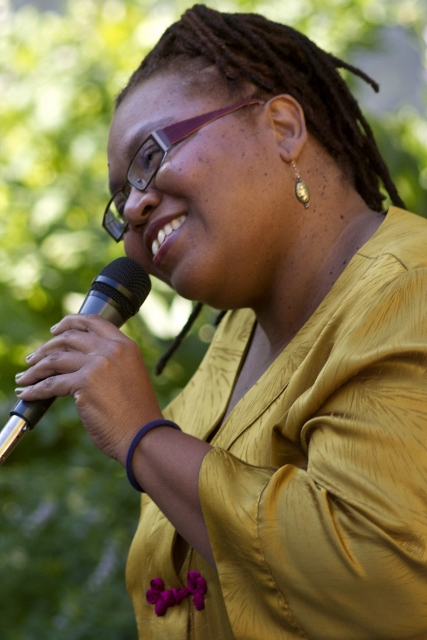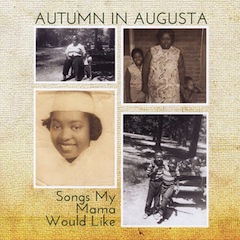SONGS MY MAMA WOULD LIKE
Autumn in Augusta
Lucy Smith comes in many guises: at present she’s music director for Chicago’s Fourth Presbyterian’s “Jazz at Four” service, which as you might guess brings a jazz flavor to vintage hymns; she’s been leader/arranger for the Lucy Smith Quartet/Quintet and served as a singer-songwriter for Passing for Normal/Swag. She’s composed and performed music for the feature film Hannah Free and the Wake Up Black documentary and has been music director for projects at the Park West Theater, Goodman Theater and at Steppenwolf Theater, all revered Chicago institutions. In short, through the years she’s been steeped in blues, gospel and jazz. As the leader of the Autumn in Augusta quartet, she brings all these styles together in a short (five songs, a little more than 18 minutes of music) but potent demonstration of empathetic, unassuming instrumental support serving Ms. Smith’s powerful, taut readings of an emotionally resonant program bearing the title Songs My Mama Would Like, “a tribute project for and about my mother and her music,” she writes in her liner note, adding: “It is music I grew up listening to and rebelling against. Now I find my mother and her music are just about everything I do. It turns out that she had pretty awesome taste!”
Autumn in August, with Lucy Smith on lead vocal, ‘Joyful Joyful We Adore You,’ perform live at Music by the Fountain in Chicago, August 2013. The combo includes Michael Caskey on drums, Marcin Fahmy on piano and Junius Paul on bass. Posted at YouTube by Lucy Smith.
Yes, she did. But the unpublished subtitle of this EP might well be (But Never Heard Quite Like This). Not that Ms. Smith works radical changes here but you do know something a little different is going on when the band–Marcin Fahmy (piano and keyboards), Junius Paul (bass) and Michael Caskey (drums)–opens the proceedings by introducing “Joyful, Joyful We Adore Thee,” the Beethoven melody from his Ninth Symphony paired with the poem Henry van Dyke wrote specifically for that melody in 1907, with a little shuffle figure and then breaks into a cool, swinging pace as Ms. Smith’s warm voice follows the arrangement’s rhythmic digressions. van Dyke said he intended this to be a “hymn of trust and joy and hope,” and the light, bright, even playful vocal suggests Ms. Smith intended to follow the van Dyke model in its captivating blend of gospel reverence and jazzy, lighthearted phrasing. The set takes a slightly darker turn in “Wayfaring Stranger,” with Fahmy’s somber, probing piano establishing the setting for Ms. Smith’s heavy-hearted vocal describing her life’s journey “through a world of woe” en route to a Heavenly reunion with her mother and father. As she does on the previous track, so she does here in traversing emotional planes from weary, even despondent lamenting to understated ebullience at the prospect of the life awaiting her “over Jordan.”
Autumn in Augusta, with Lucy Smith on lead vocal, performs ‘Wayfaring Stranger’ at Music by the Fountain, Chicago, August 2013
Like “Wayfaring Stranger” before it, the Christian hymn “How Can I Keep From Singing” begins with an ominous flourish, via the lone and lonely thump of Paul’s bass, but when Ms. Smith and pianist Fahmy enter the spirit begins a deliberate, steady surge as the lyrics anticipate a day of salvation promised in the Gospel. Given the narrative arc thus far, how then does “House of the Rising Sun” fit into this concept? Deep and bluesy, fueled by Fahmy’s moody tinkling phrases, the tune may be nothing more than one of Ms. Smith’s mother’s favorites; at the same time, given how much she reaches out to departed loved ones in the first three numbers, how telling is the chagrin in her sensitively shaded reading of the lyric, “If I had listened to what mama said/I’da been at home today/but bein’ so young and foolish, my Lord/led a rambler lead me astray…”? The combo is so discreet behind her, and her delivery so infused with regret, it’s as if the only sound you really hear is a plaintive voice so wounded as to mute the combo’s discreet backing and give the performance an a cappella-like rawness. After all this, the slow, despairing “How Long, How Long Blues,” that old Leroy Carr-Scrapper Blackwell warhorse, actually has a soothing effect, which is not to suggest Ms. Smith’s emotional, grinding attack and Fahmy’s rich, bluesy piano don’t deliver a wallop. But like the rest of his impressive encyclical, it offers a patina of hope amidst misery, which makes it all hurt so good.



